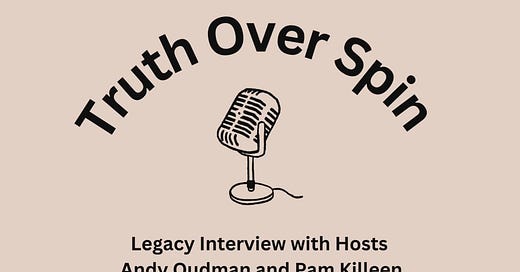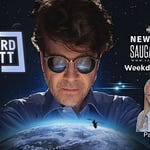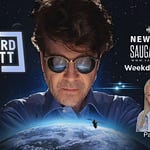Back in 2012, Andy Oudman and I had the pleasure of interviewing University of Victoria researcher Alan Cassels. At the time, he had just published Seeking Sickness: Medical Screening and the Misguided Hunt for Disease. His findings were a clarion call to Canadians, urging them to question the blind acceptance of medical screening and overdiagnosis. Thirteen years later, I see no measurable improvement in the average person’s health. If anything, we’re even more over-tested, over-treated, and over-drugged.
Cassels warned us that much of modern medicine is driven by marketing, not science. He argued that a great deal of testing is based on so-called “surrogate markers”—numerical values like cholesterol levels, BMI, or PSA scores—that may not actually indicate disease or improve outcomes. These numbers create a false sense of urgency and fear, prompting patients to undergo treatments that may offer little benefit and carry significant risk.
His book explored the harm caused by popular screening methods like mammograms, cholesterol tests, bone density scans, and especially PSA tests for prostate cancer. According to Cassels, men subjected to PSA testing often undergo aggressive treatments that do not extend life but do increase the risk of serious side effects such as incontinence, impotence, and bowel dysfunction. The United States Preventive Services Task Force (USPSTF) eventually backed up Cassels’ position, stating that PSA screening for asymptomatic men causes far more harm than good.
In Seeking Sickness, Cassels dissected the business model behind screening. He revealed how disease awareness campaigns—often funded by pharmaceutical companies—play on public fear. These campaigns push for more testing, which leads to more diagnoses, more prescriptions, and more profits. Cassels pointed out that hospitals and cancer centres in the U.S., in particular, invest in expensive surgical technology like robotic prostate removal systems, which they must market aggressively to recoup costs. This financial incentive directly conflicts with a rational, harm-reduction approach to medicine.
During our interview, Cassels voiced his concern that the healthcare system had shifted away from genuine care and prevention, toward what he called “the medicalization of risk.” He was especially critical of unnecessary procedures that could be avoided by simply improving lifestyle, sanitation, nutrition, and hygiene—all of which had already played a major role in eradicating infectious diseases long before many vaccines and drugs entered the market.
Fast forward to 2025, and Cassels’ insights remain more relevant than ever. Our healthcare system continues to collapse under the weight of overprescribing, overtreatment, and unnecessary diagnostics. Instead of acknowledging the root causes of illness—like poor nutrition, circadian disruption, and environmental toxicity—we’re still handing out pills and performing tests with questionable benefit.
Cassels emphasized the need for shared decision-making between doctors and patients, grounded in evidence—not fear or pharmaceutical marketing. His work should have served as a roadmap for reform. Unfortunately, it has largely been ignored by policymakers and medical institutions. His warnings were prophetic: if we keep prioritizing profit over patient well-being, health outcomes will continue to stagnate—or even decline.
SIDEBAR: Here's why Cassels' warnings still hold up in 2025:
1. Chronic disease rates remain high—or are worsening.
Diabetes, obesity, and mental health disorders have continued to rise globally since 2012, especially in developed countries with advanced healthcare systems.
Life expectancy in some Western nations, including the U.S. and parts of Canada, has plateaued or declined, largely due to chronic illnesses and drug-related deaths—not a sign of improved public health.
2. Overdiagnosis and overtreatment are still rampant.
Research continues to confirm that PSA testing, thyroid screening, and mammography often lead to unnecessary interventions without extending lives.
“Incidentalomas” (benign findings from imaging scans) frequently result in stress, biopsies, or surgeries that carry risks without clear benefit.
3. The financial burden of healthcare is unsustainable.
Healthcare spending has soared, yet outcomes have not significantly improved. The system often rewards volume over value, just as Cassels warned.
Preventable harm, medical errors, and adverse drug reactions still account for a staggering number of hospitalizations and deaths—despite more technology, testing, and medication.
4. Screening and testing are still driven by marketing.
Direct-to-consumer advertising and disease-awareness campaigns (many funded by pharma) continue to push people into unnecessary “wellness” checkups and lifelong prescriptions.
The problem Cassels highlighted—treating risk factors (like cholesterol levels or blood pressure) as if they were diseases—remains widespread.
Bottom line:
Cassels may have sounded an alarm in 2012, but the intervening years have only strengthened the case he made. We are not healthier—we're simply more medicated, more tested, and more entangled in a medical system that often prioritizes profit over prevention.
The good news is that although his personal website, alancassels.com, is no longer active, Alan Cassels maintains an active presence on X (formerly Twitter) under the handle @AKECassels. For those who want to be better informed about the true costs—and questionable benefits—of many conventional medical practices, his body of work is an invaluable resource. His writings are still available and as compelling as ever. A couple of noteworthy articles include Drug Bust and Pfizer Doesn’t Give a Damn and How Perfectly Healthy People are Turned into Patients. For a compilation of his articles, you can visit his author page on The Tyee or Muck Rack. His books, Selling Sickness and Seeking Sickness are available on Amazon.
Pam Killeen is a health and sleep coach, author, podcaster and advocate for circadian health, with almost four decades of experience in the wellness field. Her career has evolved from focusing on nutrition and natural health strategies to integrating the critical principles of circadian biology into her online practice.
She is the author of three books—The Great Bird Flu Hoax (co-authored with Dr. Joseph Mercola); Addiction: The Hidden Epidemic; and Survival of the Unfittest—which highlight her deep interest in nutrition. Reflecting on her work, she wishes she had included information about circadian practices in her writing and consultations but believes it’s never too late to start. Her website is www.pamkilleen.com.












Share this post